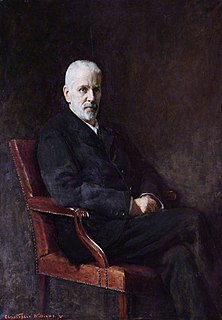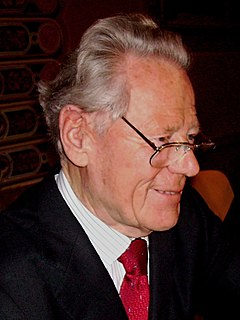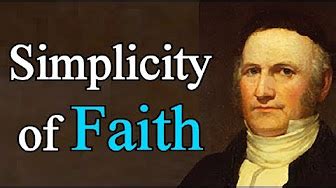A Quote by Claude Montefiore
How anyone can believe in eternal punishment, or in any soul which God has made being "lost" and also believes in the love, nay, even in the justice of God is a mystery indeed.
Related Quotes
Even apart from the image of a truly merciless God that contradicts everything we can assume from what Jesus says about the Either of the lost, can we be surprised at a time when retributive punishments without an opportunity of probation are being increasingly abandoned in education and penal justice, that the idea not only of a lifelong, but even eternal punishment of body and soul, seems to many people absolutely monstrous.
When we look at the cross we see the justice, love, wisdom and power of God. It is not easy to decide which is the most luminously revealed, whether the justice of God in judging sin, or the love of God in bearing the judgment in our place, or the wisdom of God in perfectly combining the two, or the power of God in saving those who believe. For the cross is equally an act, and therefore a demonstration, of God’s justice, love, wisdom and power. The cross assures us that this God is the reality within, behind and beyond the universe.
There is a power in the soul, quite separate from the intellect, which sweeps away or recognizes the marvelous, by which God is felt. Faith stands serenely far above the reach of the atheism of science. It does not rest on the wonderful, but on the eternal wisdom and goodness of God. The revelation of the Son was to proclaim a Father, not a mystery. No science can sweep away the everlasting love which the heart feels, and which the intellect does not even pretend to judge or recognize.
For indeed, grace is the key to it all. It is not our lavish good deeds that procure salvation, but God's lavish love and mercy. That is why the poor are as acceptable before God as the rich. It is the generosity of God, the freeness of his salvation, that lays the foundation for the society of justice for all. Even in the seemingly boring rules and regulations of tabernacle rituals, we see that God cares about the poor, that his laws make provision for the disadvantaged. God's concern for justice permeated every part of Israel's life. It should also permeate our lives.
God felt, God tasted and enjoyed is indeed God, but God with those gifts which flatter the soul, God in darkness, in privation, in forsakenness, in sensibility, is so much God, that he is so to speak God bare and alone. Shall we fear this death, which is to produce in us the true divine life of grace?
Justice is immortal, eternal, and immutable, like God Himself; and the development of law is only then a progress when it is directed towards those principles which like Him, are eternal; and whenever prejudice or error succeeds in establishing in customary law any doctrine contrary to eternal justice.
When a soul has advanced so far on the spiritual road as to be lost to all the natural methods of communing with God; when it seeks Him no longer by meditation, images, impressions, nor by any other created ways, or representations of sense, but only by rising above them all, in the joyful communion with Him by faith and love, then it may be said to have found God of a truth, because it has truly lost itself as to all that is not God, and also as to its own self.
Those who say they believe in God and yet neither love nor fear Him, do not in fact believe in Him but in those who have taught them that God exists. Those who believe that they believe in God, but without any passion in their heart, any anguish of mind, without uncertainty, without doubt, without an element of despair even in their consolation, believe only in the God-idea, not in God.
God is not justice. Justice is in his nature, but love is predominant. People attach such importance to actions and their results. They do not know that above action and result is a law which can consume the fire of hell, which can dominate even if the whole world were being drowned in the flood of destruction; they do not know that the power of love is greater than any other.
God is infinite and without end, but the soul's desire is an abyss which cannot be filled except by a Good which is infinite; and the more ardently the soul longeth after God, the more she wills to long after him; for God is a Good without drawback, and a well of living water without bottom, and the soul is made in the image of God, and therefore it is created to know and love God.
By His gracious condescension God became man and is called man for the sake of man and by exchanging His condition for ours revealed the power that elevates man to God through his love for God and brings God down to man because of His love for man. By this blessed inversion, man is made God by divinization and God is made man by hominization. For the Word of God and God wills always and in all things to accomplish the mystery of His embodiment.









































